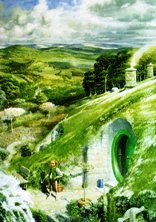May 8: TA2942
12 June 2009 11:41:44They leave Rivendell for Hobbiton, which they reach on June 22
As Gandalf & Bilbo retrace their steps from Rivendell to Hobbiton, they come to the place where the dwarves buried the trolls' gold. Bilbo doesn't feel the need to take his share, but Gandalf insists: "You may find you have more need than you expect." This suggests that something's afoot, and so it proves, for when Bilbo reaches Hobbiton he finds that he is "presumed dead" and Bag End is in the process of being sold off. He manages to save the house but is forced to buy back a lot of his own furniture - and the legal wrangle, we are told, takes about a year. Moreover, Bilbo is considered "no longer quite respectable . . . he took to writing poetry and visiting the elves." In other words he doesn't care what others think - and even starts to write his memoirs!
Some years later, a visit from Gandalf & Balin ties up some loose ends. Bard has built a town in Dale; Laketown has been restored but the Master fell prey to "dragon sickness" and ran off with the gold. Bilbo comments that the prophecies in the old songs have come true, and Gandalf puts his adventures into perspective, hinting as he does so that some greater power has been at work:
Tolkien's ending to The Hobbit virtually brings Bilbo full circle. He arrives home on mid-year's day, the anniversary of his departure from Rivendell, and is back in his homely context by the end of the tale. Not without a struggle, however: a lot has changed since he left and has to be put right; and Bilbo himself has changed.
So what have we, the readers, learnt by the end of the book? Amongst other things: that a "little fellow" can make a huge difference when he discovers his bravery and resourcefulness; patience and determination have their place alongside quick wits and snap decisions; fear of the unknown can be worse than the reality; and most ordinary folk long for peace whatever their background. As John Garth points out:
Similar themes appear in LOTR, again chiefly through the experiences of the hobbits. In the final lesson of The Hobbit Bilbo discovers that life goes on while the traveller is away, as do Frodo and his companions in The Scouring of the Shire. Bilbo's final words "Thank Goodness!" in response to Gandalf's comment are echoed by Sam Gamgee's "Well, I'm back", each tale ending with the "little fellow" happy to be home where he belongs, but subtly changed forever by his experiences.
* Tolkien & the Great War, HarperCollins 2003
Some years later, a visit from Gandalf & Balin ties up some loose ends. Bard has built a town in Dale; Laketown has been restored but the Master fell prey to "dragon sickness" and ran off with the gold. Bilbo comments that the prophecies in the old songs have come true, and Gandalf puts his adventures into perspective, hinting as he does so that some greater power has been at work:
- "You don't really suppose, do you, that all your adventures and escapes were managed by mere luck, just for your sole benefit? You are a very fine person, Mr Baggins, and I am very fond of you, but you are only quite a little fellow in a wide world, after all!"
Tolkien's ending to The Hobbit virtually brings Bilbo full circle. He arrives home on mid-year's day, the anniversary of his departure from Rivendell, and is back in his homely context by the end of the tale. Not without a struggle, however: a lot has changed since he left and has to be put right; and Bilbo himself has changed.
So what have we, the readers, learnt by the end of the book? Amongst other things: that a "little fellow" can make a huge difference when he discovers his bravery and resourcefulness; patience and determination have their place alongside quick wits and snap decisions; fear of the unknown can be worse than the reality; and most ordinary folk long for peace whatever their background. As John Garth points out:
- It would be misleading to suggest that The Hobbit is Tolkien's wartime experience in disguise; yet it is easy to see how some of his memories must have invigorated this tale of an ennobling rite of passage past the fearful jaws of death. *
Similar themes appear in LOTR, again chiefly through the experiences of the hobbits. In the final lesson of The Hobbit Bilbo discovers that life goes on while the traveller is away, as do Frodo and his companions in The Scouring of the Shire. Bilbo's final words "Thank Goodness!" in response to Gandalf's comment are echoed by Sam Gamgee's "Well, I'm back", each tale ending with the "little fellow" happy to be home where he belongs, but subtly changed forever by his experiences.
* Tolkien & the Great War, HarperCollins 2003
© Middle-earth Journeys. Images © Alan Lee.
